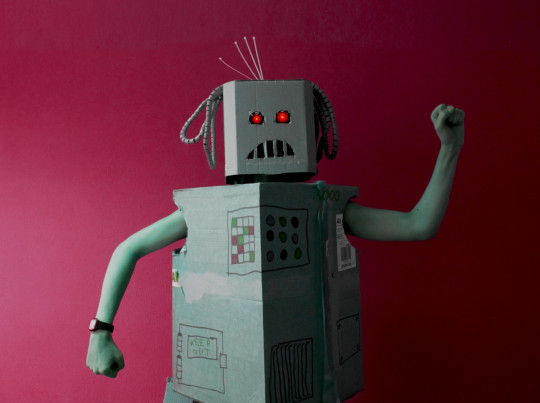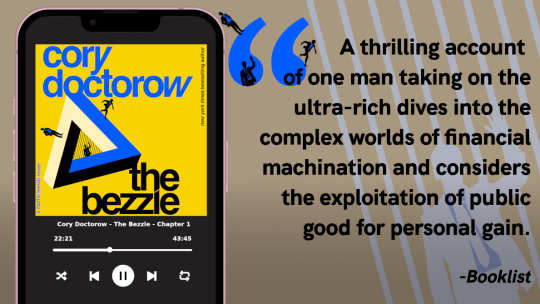#passive income brainworms
Text
I assure you, an AI didn’t write a terrible “George Carlin” routine

There are only TWO MORE DAYS left in the Kickstarter for the audiobook of The Bezzle, the sequel to Red Team Blues, narrated by @wilwheaton! You can pre-order the audiobook and ebook, DRM free, as well as the hardcover, signed or unsigned. There's also bundles with Red Team Blues in ebook, audio or paperback.

On Hallowe'en 1974, Ronald Clark O'Bryan murdered his son with poisoned candy. He needed the insurance money, and he knew that Halloween poisonings were rampant, so he figured he'd get away with it. He was wrong:
https://en.wikipedia.org/wiki/Ronald_Clark_O%27Bryan
The stories of Hallowe'en poisonings were just that – stories. No one was poisoning kids on Hallowe'en – except this monstrous murderer, who mistook rampant scare stories for truth and assumed (incorrectly) that his murder would blend in with the crowd.
Last week, the dudes behind the "comedy" podcast Dudesy released a "George Carlin" comedy special that they claimed had been created, holus bolus, by an AI trained on the comedian's routines. This was a lie. After the Carlin estate sued, the dudes admitted that they had written the (remarkably unfunny) "comedy" special:
https://arstechnica.com/ai/2024/01/george-carlins-heirs-sue-comedy-podcast-over-ai-generated-impression/
As I've written, we're nowhere near the point where an AI can do your job, but we're well past the point where your boss can be suckered into firing you and replacing you with a bot that fails at doing your job:
https://pluralistic.net/2024/01/15/passive-income-brainworms/#four-hour-work-week
AI systems can do some remarkable party tricks, but there's a huge difference between producing a plausible sentence and a good one. After the initial rush of astonishment, the stench of botshit becomes unmistakable:
https://www.theguardian.com/commentisfree/2024/jan/03/botshit-generative-ai-imminent-threat-democracy
Some of this botshit comes from people who are sold a bill of goods: they're convinced that they can make a George Carlin special without any human intervention and when the bot fails, they manufacture their own botshit, assuming they must be bad at prompting the AI.
This is an old technology story: I had a friend who was contracted to livestream a Canadian awards show in the earliest days of the web. They booked in multiple ISDN lines from Bell Canada and set up an impressive Mbone encoding station on the wings of the stage. Only one problem: the ISDNs flaked (this was a common problem with ISDNs!). There was no way to livecast the show.
Nevertheless, my friend's boss's ordered him to go on pretending to livestream the show. They made a big deal of it, with all kinds of cool visualizers showing the progress of this futuristic marvel, which the cameras frequently lingered on, accompanied by overheated narration from the show's hosts.
The weirdest part? The next day, my friend – and many others – heard from satisfied viewers who boasted about how amazing it had been to watch this show on their computers, rather than their TVs. Remember: there had been no stream. These people had just assumed that the problem was on their end – that they had failed to correctly install and configure the multiple browser plugins required. Not wanting to admit their technical incompetence, they instead boasted about how great the show had been. It was the Emperor's New Livestream.
Perhaps that's what happened to the Dudesy bros. But there's another possibility: maybe they were captured by their own imaginations. In "Genesis," an essay in the 2007 collection The Creationists, EL Doctorow (no relation) describes how the ancient Babylonians were so poleaxed by the strange wonder of the story they made up about the origin of the universe that they assumed that it must be true. They themselves weren't nearly imaginative enough to have come up with this super-cool tale, so God must have put it in their minds:
https://pluralistic.net/2023/04/29/gedankenexperimentwahn/#high-on-your-own-supply
That seems to have been what happened to the Air Force colonel who falsely claimed that a "rogue AI-powered drone" had spontaneously evolved the strategy of killing its operator as a way of clearing the obstacle to its main objective, which was killing the enemy:
https://pluralistic.net/2023/06/04/ayyyyyy-eyeeeee/
This never happened. It was – in the chagrined colonel's words – a "thought experiment." In other words, this guy – who is the USAF's Chief of AI Test and Operations – was so excited about his own made up story that he forgot it wasn't true and told a whole conference-room full of people that it had actually happened.
Maybe that's what happened with the George Carlinbot 3000: the Dudesy dudes fell in love with their own vision for a fully automated luxury Carlinbot and forgot that they had made it up, so they just cheated, assuming they would eventually be able to make a fully operational Battle Carlinbot.
That's basically the Theranos story: a teenaged "entrepreneur" was convinced that she was just about to produce a seemingly impossible, revolutionary diagnostic machine, so she faked its results, abetted by investors, customers and others who wanted to believe:
https://en.wikipedia.org/wiki/Theranos
The thing about stories of AI miracles is that they are peddled by both AI's boosters and its critics. For boosters, the value of these tall tales is obvious: if normies can be convinced that AI is capable of performing miracles, they'll invest in it. They'll even integrate it into their product offerings and then quietly hire legions of humans to pick up the botshit it leaves behind. These abettors can be relied upon to keep the defects in these products a secret, because they'll assume that they've committed an operator error. After all, everyone knows that AI can do anything, so if it's not performing for them, the problem must exist between the keyboard and the chair.
But this would only take AI so far. It's one thing to hear implausible stories of AI's triumph from the people invested in it – but what about when AI's critics repeat those stories? If your boss thinks an AI can do your job, and AI critics are all running around with their hair on fire, shouting about the coming AI jobpocalypse, then maybe the AI really can do your job?
https://locusmag.com/2020/07/cory-doctorow-full-employment/
There's a name for this kind of criticism: "criti-hype," coined by Lee Vinsel, who points to many reasons for its persistence, including the fact that it constitutes an "academic business-model":
https://sts-news.medium.com/youre-doing-it-wrong-notes-on-criticism-and-technology-hype-18b08b4307e5
That's four reasons for AI hype:
to win investors and customers;
to cover customers' and users' embarrassment when the AI doesn't perform;
AI dreamers so high on their own supply that they can't tell truth from fantasy;
A business-model for doomsayers who form an unholy alliance with AI companies by parroting their silliest hype in warning form.
But there's a fifth motivation for criti-hype: to simplify otherwise tedious and complex situations. As Jamie Zawinski writes, this is the motivation behind the obvious lie that the "autonomous cars" on the streets of San Francisco have no driver:
https://www.jwz.org/blog/2024/01/driverless-cars-always-have-a-driver/
GM's Cruise division was forced to shutter its SF operations after one of its "self-driving" cars dragged an injured pedestrian for 20 feet:
https://www.wired.com/story/cruise-robotaxi-self-driving-permit-revoked-california/
One of the widely discussed revelations in the wake of the incident was that Cruise employed 1.5 skilled technical remote overseers for every one of its "self-driving" cars. In other words, they had replaced a single low-waged cab driver with 1.5 higher-paid remote operators.
As Zawinski writes, SFPD is well aware that there's a human being (or more than one human being) responsible for every one of these cars – someone who is formally at fault when the cars injure people or damage property. Nevertheless, SFPD and SFMTA maintain that these cars can't be cited for moving violations because "no one is driving them."
But figuring out who which person is responsible for a moving violation is "complicated and annoying to deal with," so the fiction persists.
(Zawinski notes that even when these people are held responsible, they're a "moral crumple zone" for the company that decided to enroll whole cities in nonconsensual murderbot experiments.)
Automation hype has always involved hidden humans. The most famous of these was the "mechanical Turk" hoax: a supposed chess-playing robot that was just a puppet operated by a concealed human operator wedged awkwardly into its carapace.
This pattern repeats itself through the ages. Thomas Jefferson "replaced his slaves" with dumbwaiters – but of course, dumbwaiters don't replace slaves, they hide slaves:
https://www.stuartmcmillen.com/blog/behind-the-dumbwaiter/
The modern Mechanical Turk – a division of Amazon that employs low-waged "clickworkers," many of them overseas – modernizes the dumbwaiter by hiding low-waged workforces behind a veneer of automation. The MTurk is an abstract "cloud" of human intelligence (the tasks MTurks perform are called "HITs," which stands for "Human Intelligence Tasks").
This is such a truism that techies in India joke that "AI" stands for "absent Indians." Or, to use Jathan Sadowski's wonderful term: "Potemkin AI":
https://reallifemag.com/potemkin-ai/
This Potemkin AI is everywhere you look. When Tesla unveiled its humanoid robot Optimus, they made a big flashy show of it, promising a $20,000 automaton was just on the horizon. They failed to mention that Optimus was just a person in a robot suit:
https://www.siliconrepublic.com/machines/elon-musk-tesla-robot-optimus-ai
Likewise with the famous demo of a "full self-driving" Tesla, which turned out to be a canned fake:
https://www.reuters.com/technology/tesla-video-promoting-self-driving-was-staged-engineer-testifies-2023-01-17/
The most shocking and terrifying and enraging AI demos keep turning out to be "Just A Guy" (in Molly White's excellent parlance):
https://twitter.com/molly0xFFF/status/1751670561606971895
And yet, we keep falling for it. It's no wonder, really: criti-hype rewards so many different people in so many different ways that it truly offers something for everyone.

If you'd like an essay-formatted version of this post to read or share, here's a link to it on pluralistic.net, my surveillance-free, ad-free, tracker-free blog:
https://pluralistic.net/2024/01/29/pay-no-attention/#to-the-little-man-behind-the-curtain


Back the Kickstarter for the audiobook of The Bezzle here!

Image:
Cryteria (modified)
https://commons.wikimedia.org/wiki/File:HAL9000.svg
CC BY 3.0
https://creativecommons.org/licenses/by/3.0/deed.en
--
Ross Breadmore (modified)
https://www.flickr.com/photos/rossbreadmore/5169298162/
CC BY 2.0
https://creativecommons.org/licenses/by/2.0/
#pluralistic#ai#absent indians#mechanical turks#scams#george carlin#comedy#body-snatchers#fraud#theranos#guys in robot suits#criti-hype#machine learning#fake it til you make it#too good to fact-check#mturk#deepfakes
2K notes
·
View notes
Text
Cory Doctorow: Flickr takes action against Creative Commons/copyleft trolls; how Cory and his long-distance romance played a modest role in founding Flickr; “Yahoo’s haunted armada of Web 2.0 ghost-ships”; the “depravity of copyleft trolls”; Marco Verch; “the passive-income brainworm – a parasitic, end-stage capitalist hustle.”
24 notes
·
View notes
Quote
「botshit」は昨年12月に生まれたばかりの造語だが、すでにインターネットはbotshitの肥溜めと化している。まともな収入を得る機会が激減し、高速椅子取りゲームまがいの経済状況にあって、絶望した人々は「不労所得」を求め、そして詐欺師に騙されるがままに山のようなbotshitを生成している。
https://pluralistic.net/2024/01/15/passive-income-brainworms/#four-hour-work-week
botshitは想像を絶する速度と規模で生み出されている。Amazonが自費出版できる「冊数」を1日3冊に制限せざるを得なくなった理由は、よくおわかりだろう。
https://www.theguardian.com/books/2023/sep/20/amazon-restricts-authors-from-self-publishing-more-than-three-books-a-day-after-ai-concerns
ウェブがbotshitの肥溜めとなり、インターネットのコアサンプルに含まれる人間製の「コンテンツ」の量はホメオパシーレベルにまで希釈されている。Cnetの記事から法的文書に至るまで、高品質とされる情報ソースでさえ、botshitに汚染されている。
https://theconversation.com/ai-is-creating-fake-legal-cases-and-making-its-way-into-real-courtrooms-with-disastrous-results-225080
皮肉なことに、AI企業自身がこの問題の火種を作っている。GoogleやMicrosoftによる「AI検索」の全面的な推進は、検索エンジンがウェブページへのリンクを返すのではなく、そのコンテンツを要約する未来を想定している。しかし、そうなれば誰がウェブを書くだろうか。あなたの書いたものを見つけられるのはAIのクローラーだけで、しかもそのAIはあなたの書いたものを自分のトレーニングの餌にするだけで、読者にあなたの書いたものを紹介する気は毛頭ない。AIが検索を支配すれば、オープンウェブはAIの工業的畜産場(CAFO)となり、検索クローラーはますます肥溜めからクソを吸い上げるようになるだろう。
この問題はずっと前から指摘されていた。1年ほど前、ジェイサン・サドウスキーは、ある機械学習モデルの出力で別のモデルを訓練することを「ハプスブルクAI」と名付けた。
https://twitter.com/jathansadowski/status/1625245803211272194
直感的にも、これはマズい考えだとわかるだろう。病気にかかった牛の肉骨粉を他の牛に与えるようなものだから。
https://www.cdc.gov/prions/bse/index.html
最近の論文「再帰の呪い:生成データでの訓練がモデルに忘却をもたらす(The Curse of Recursion: Training on Generated Data Makes Models Forget)」では、botshitを餌とするAIへの嫌悪感を超えて、その数学的帰結を掘り下げている。
https://arxiv.org/abs/2305.17493
共著者のロス・アンダーソンは、「生成されたコンテンツを使ってトレーニングすると、モデルに不可逆的な欠陥が生じる」と端的にまとめている。
https://www.lightbluetouchpaper.org/2023/06/06/will-gpt-models-choke-on-their-own-exhaust/
つまり、たとえ「訓練データを増やしさえすれば、(アナリストが数兆ドルもの評価額で喧伝する高価値アプリとしては全くもってふさわしくない)AIの問題は解決される」という信仰を受け入れたとしても、その訓練データの確保はますます難しくなるのだ。
さらに、「訓練データを増やせばAIの予測精度を線形的に改善する」という命題は単なる信仰に過ぎないが、「AIの出力を訓練データに使うと、AIは指数関数的に悪化する」のは事実なのである。
食糞AIがもたらす危機:botshitの肥溜めと化すインターネットの未来 | p2ptk[.]org
2 notes
·
View notes
Quote
Consider the problem of "botshit," Andre Spicer and co's very useful coinage describing "inaccurate or fabricated content" shat out at scale by AIs:
https://papers.ssrn.com/sol3/papers.cfm?abstract_id=4678265
"Botshit" was coined last December, but the internet is already drowning in it. Desperate people, confronted with an economy modeled on a high-speed game of musical chairs in which the opportunities for a decent livelihood grow ever scarcer, are being scammed into generating mountains of botshit in the hopes of securing the elusive "passive income":
https://pluralistic.net/2024/01/15/passive-income-brainworms/#four-hour-work-week
Botshit can be produced at a scale and velocity that beggars the imagination. Consider that Amazon has had to cap the number of self-published "books" an author can submit to a mere three books per day:
Pluralistic: The Coprophagic AI crisis (14 Mar 2024) – Pluralistic: Daily links from Cory Doctorow
0 notes
Text
The Coprophagic AI crisis

I'm on tour with my new, nationally bestselling novel The Bezzle! Catch me in TORONTO on Mar 22, then with LAURA POITRAS in NYC on Mar 24, then Anaheim, and more!

A key requirement for being a science fiction writer without losing your mind is the ability to distinguish between science fiction (futuristic thought experiments) and predictions. SF writers who lack this trait come to fancy themselves fortune-tellers who SEE! THE! FUTURE!
The thing is, sf writers cheat. We palm cards in order to set up pulp adventure stories that let us indulge our thought experiments. These palmed cards – say, faster-than-light drives or time-machines – are narrative devices, not scientifically grounded proposals.
Historically, the fact that some people – both writers and readers – couldn't tell the difference wasn't all that important, because people who fell prey to the sf-as-prophecy delusion didn't have the power to re-orient our society around their mistaken beliefs. But with the rise and rise of sf-obsessed tech billionaires who keep trying to invent the torment nexus, sf writers are starting to be more vocal about distinguishing between our made-up funny stories and predictions (AKA "cyberpunk is a warning, not a suggestion"):
https://www.antipope.org/charlie/blog-static/2023/11/dont-create-the-torment-nexus.html
In that spirit, I'd like to point to how one of sf's most frequently palmed cards has become a commonplace of the AI crowd. That sleight of hand is: "add enough compute and the computer will wake up." This is a shopworn cliche of sf, the idea that once a computer matches the human brain for "complexity" or "power" (or some other simple-seeming but profoundly nebulous metric), the computer will become conscious. Think of "Mike" in Heinlein's *The Moon Is a Harsh Mistress":
https://en.wikipedia.org/wiki/The_Moon_Is_a_Harsh_Mistress#Plot
For people inflating the current AI hype bubble, this idea that making the AI "more powerful" will correct its defects is key. Whenever an AI "hallucinates" in a way that seems to disqualify it from the high-value applications that justify the torrent of investment in the field, boosters say, "Sure, the AI isn't good enough…yet. But once we shovel an order of magnitude more training data into the hopper, we'll solve that, because (as everyone knows) making the computer 'more powerful' solves the AI problem":
https://locusmag.com/2023/12/commentary-cory-doctorow-what-kind-of-bubble-is-ai/
As the lawyers say, this "cites facts not in evidence." But let's stipulate that it's true for a moment. If all we need to make the AI better is more training data, is that something we can count on? Consider the problem of "botshit," Andre Spicer and co's very useful coinage describing "inaccurate or fabricated content" shat out at scale by AIs:
https://papers.ssrn.com/sol3/papers.cfm?abstract_id=4678265
"Botshit" was coined last December, but the internet is already drowning in it. Desperate people, confronted with an economy modeled on a high-speed game of musical chairs in which the opportunities for a decent livelihood grow ever scarcer, are being scammed into generating mountains of botshit in the hopes of securing the elusive "passive income":
https://pluralistic.net/2024/01/15/passive-income-brainworms/#four-hour-work-week
Botshit can be produced at a scale and velocity that beggars the imagination. Consider that Amazon has had to cap the number of self-published "books" an author can submit to a mere three books per day:
https://www.theguardian.com/books/2023/sep/20/amazon-restricts-authors-from-self-publishing-more-than-three-books-a-day-after-ai-concerns
As the web becomes an anaerobic lagoon for botshit, the quantum of human-generated "content" in any internet core sample is dwindling to homeopathic levels. Even sources considered to be nominally high-quality, from Cnet articles to legal briefs, are contaminated with botshit:
https://theconversation.com/ai-is-creating-fake-legal-cases-and-making-its-way-into-real-courtrooms-with-disastrous-results-225080
Ironically, AI companies are setting themselves up for this problem. Google and Microsoft's full-court press for "AI powered search" imagines a future for the web in which search-engines stop returning links to web-pages, and instead summarize their content. The question is, why the fuck would anyone write the web if the only "person" who can find what they write is an AI's crawler, which ingests the writing for its own training, but has no interest in steering readers to see what you've written? If AI search ever becomes a thing, the open web will become an AI CAFO and search crawlers will increasingly end up imbibing the contents of its manure lagoon.
This problem has been a long time coming. Just over a year ago, Jathan Sadowski coined the term "Habsburg AI" to describe a model trained on the output of another model:
https://twitter.com/jathansadowski/status/1625245803211272194
There's a certain intuitive case for this being a bad idea, akin to feeding cows a slurry made of the diseased brains of other cows:
https://www.cdc.gov/prions/bse/index.html
But "The Curse of Recursion: Training on Generated Data Makes Models Forget," a recent paper, goes beyond the ick factor of AI that is fed on botshit and delves into the mathematical consequences of AI coprophagia:
https://arxiv.org/abs/2305.17493
Co-author Ross Anderson summarizes the finding neatly: "using model-generated content in training causes irreversible defects":
https://www.lightbluetouchpaper.org/2023/06/06/will-gpt-models-choke-on-their-own-exhaust/
Which is all to say: even if you accept the mystical proposition that more training data "solves" the AI problems that constitute total unsuitability for high-value applications that justify the trillions in valuation analysts are touting, that training data is going to be ever-more elusive.
What's more, while the proposition that "more training data will linearly improve the quality of AI predictions" is a mere article of faith, "training an AI on the output of another AI makes it exponentially worse" is a matter of fact.

Name your price for 18 of my DRM-free ebooks and support the Electronic Frontier Foundation with the Humble Cory Doctorow Bundle.

If you'd like an essay-formatted version of this post to read or share, here's a link to it on pluralistic.net, my surveillance-free, ad-free, tracker-free blog:
https://pluralistic.net/2024/03/14/14/inhuman-centipede#enshittibottification

Image:
Plamenart (modified)
https://commons.wikimedia.org/wiki/File:Double_Mobius_Strip.JPG
CC BY-SA 4.0
https://creativecommons.org/licenses/by-sa/4.0/deed.en
#pluralistic#ai#generative ai#André Spicer#botshit#habsburg ai#jathan sadowski#ross anderson#inhuman centipede#science fiction#mysticism
549 notes
·
View notes